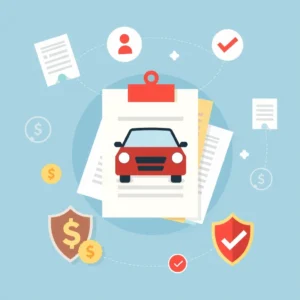Essential Guide to Secure Accurate Auto Insurance Quotes
1. Auto Insurance Quotes
.1 What is an Auto Insurance Quote?
An auto insurance quotes is a detailed estimate provided by an insurance company that outlines how much you might pay for your auto insurance coverage. The purpose of these quotes is to give you a clear understanding of your potential premiums and coverage options.
- How Quotes are Generated: Insurance companies use a variety of factors to compute your quote, including your driving history, the type of vehicle you drive, and more. It’s like an assessment of risk based on your unique profile.
- Types of Coverage Included: Quotes typically provide options for liability, collision, comprehensive coverage, and sometimes even extras like roadside assistance or rental car reimbursement.
Table of Contents
1.2 Factors Influencing Auto Insurance Quotes
Several factors can impact your auto insurance quote, which can often lead to significant differences in price.
- Driver Demographics: Your age, gender, and driving record play a crucial role. For instance, younger drivers may face higher rates due to relatively less driving experience.
- Vehicle Specifics: The make, model, and year of your car are also significant. Sports cars or vehicles known for high repair costs often come with steeper quotes.
- Geographic Location: Your city or even neighborhood can make a difference. Areas with high rates of accidents or theft may see higher premiums.
1.3 Importance of Accurate Quotes
Getting accurate auto insurance quotes is crucial in setting expectations for your premium rates.
- How Accuracy Affects Premium Rates: An accurate quote helps prevent unexpected charges. If a quote underestimates your premium, you might encounter a surprising bill later on.
- Avoiding Underinsurance or Overinsurance: Ensuring your quote rightly reflects your needs helps you avoid being underinsured in an accident or paying for unnecessary coverage.
- Building Trust with Insurers: When you receive consistent, accurate quotes, it establishes a foundation of trust with your insurer.
Preparing for the Quote Process
2.1 Gather Essential Information
Before soliciting quotes, having the right documents and information handy can streamline the process.
- Required Personal Details: You’ll need to provide your name, address, driver’s license number, and sometimes your Social Security number for background checks.
- Vehicle Information Checklist: Prepare specifics about your vehicle: the VIN, make, model, year, and any safety features that it has.
- Documents Needed: Having your current insurance policy, recent driving record, and any accident history ready can be very helpful.
2.2 Assess Your Coverage Needs
Understanding what kind of protection you need is key.
- Evaluating State Minimums: Each state has minimum coverage requirements. Familiarize yourself with these, and assess whether you need more than the minimum.
- Understanding Types of Coverage: Different coverage types—like liability, comprehensive, and collision—serve various purposes. Make sure to know how these affect your protection.
- Considering Additional Protections: Options such as uninsured motorist coverage can provide peace of mind and should be considered based on your needs.
2.3 Researching Insurance Companies
Choosing the right insurer is as important as selecting the right coverage.
- Investigating Various Insurers: Check reviews and ratings of different companies. Word of mouth from friends and family can be very telling.
- Importance of Customer Service Ratings: Good customer service can make a huge difference when you need to file a claim.
- Checking for Discounts: Look out for discounts! Many companies offer reductions for safe driving records or bundling policies.
Obtaining Quotes Effectively
3.1 Using Online Quote Tools
The internet offers many resources to help you compare quotes efficiently.
- Overview of Popular Online Tools: Sites like Compare.com and NerdWallet can help you gather multiple quotes from different providers easily.
- Navigating Platforms Efficiently: Spend some time familiarizing yourself with these platforms. They often have guided steps that lead to better quotes.
- Understanding Quote Approximations vs. Finalized Rates: Remember that online quotes can vary from final rates due to more detailed information required later.
3.2 Contacting Agents or Brokers
Sometimes speaking directly to an agent can help you get better insights than simply relying on online tools.
- Benefits of Speaking Directly: Agents can clarify any confusing terms and provide personalized assistance.
- Questions to Ask During the Quote Process: Don’t hesitate to ask questions about coverage options, discounts, and claim processes to make an informed choice.
- Leveraging an Agent for Advice: Agents can help you identify ways to save money with tailored recommendations based on your profile.
3.3 Comparing Quotes from Different Providers
A methodical comparison can save you money.
- Creating a Side-by-Side Comparison Chart: List quotes side by side on a chart for easier comparison of coverage options and costs.
- Identifying Best Value: Look beyond the cost—consider coverage limits, deductibles, and customer service records to find the best value.
- Recognizing Red Flags: Be wary of quotes that are significantly lower than others, as this might indicate limited coverage or high deductibles.
Reviewing and Finalizing Your Quote
4.1 Analyzing Quote Details
Once you’ve received your quotes, comprehension is key.
- Understanding the Breakdown of Costs: Check itemized lists in your quotes. Knowing what you’re paying for can make a big difference in your chosen policy.
- Checking for Exclusions or Terms: Look out for any exclusions or special terms that may affect your coverage.
- Ensuring Needed Coverage Options are Included: Double-check that all necessary coverages are reflected in your final quote.
4.2 Negotiation Tips
Don’t hesitate to negotiate your terms and premiums.
- How to Negotiate: If you feel a quote is too high, ask for discounts or find out if they can offer lower premiums.
- Discussing Discounts and Bundled Policies: Talk about any possible discounts for bundling your auto insurance with homeowners or renters.
- Evaluating Loyalty Programs: If you’re a long-time customer, ask about loyalty discounts or bundled offers to maximize your savings.
4.3 Final Steps Before Purchase
Before you finalize your purchase, take these precautions.
- Ensuring No Mistakes in Your Details: Double-check your personal and vehicle information for any errors.
- Final Review of Terms and Conditions: Make sure you fully understand the terms and conditions of your policy.
- Setting a Payment Plan Decision: Decide whether you want to pay monthly or annually and confirm this with your insurer.
Maintaining Your Auto Insurance
5.1 Regularly Review Your Policy
Don’t just set it and forget it—review your policy regularly!
- When and Why to Review Coverage: At least annually, revisit your policy to ensure it still meets your needs.
- Adjusting Based on Life Changes: If you’ve moved, purchased a new vehicle, or had any changes in your household, make sure these are reflected in your policy.
- Importance of Pricing Your Policy Annually: Shop around each year; you might find better rates or coverage.
5.2 Staying Informed About Industry Changes
Keeping up with the auto insurance landscape can save you money.
- Understanding Market Trends: Economic trends and changes in the market can impact your quotes significantly.
- Keeping Up with State Laws: Be aware of any legislation that may affect your coverage requirements.
- Recognizing Financial Health: An insurer’s financial health can indicate their ability to pay out claims.
5.3 Using Technology to Monitor Quotes
Technology can be your best friend in maintaining your insurance!
- Utilizing Apps and Tools: Applications like Insurify can help you keep track of fairly priced insurance options.
- Setting Reminders for Renewals: Use your phone calendar to remind you when it’s time to shop for quotes again.
- Understanding Telematics: Programs that monitor your driving habits could lead to discounted rates based on safe driving.
Conclusion
Obtaining accurate auto insurance quotes is fundamental to not only saving money but also ensuring you have the right coverage for your needs. Being proactive, regularly comparing quotes, and understanding your coverage options will empower you in managing your auto insurance effectively.
Frequently Asked Questions (FAQs)
- What should I do if I receive significantly different quotes from providers?
- It’s wise to review what different factors or coverage options may account for those differences and consult with the insurers directly to clarify.
- How often should I shop for new auto insurance quotes?
- You should shop for new quotes at least once a year or whenever you experience major life changes, like moving or getting a new vehicle.
- Can my credit score affect my auto insurance quote?
- Yes, many insurers use credit scores as one of the factors to determine the risk level, which can affect your quote.
- What types of discounts should I look for when getting quotes?
- Look for safe driver discounts, bundling discounts, and discounts for having features like anti-theft devices in your vehicle.
- Is it better to go through an agent or get quotes online?
- It depends on your comfort level and preferences. Agents can provide personalized advice, while online tools may give you quick comparisons. Both methods have their merits!

